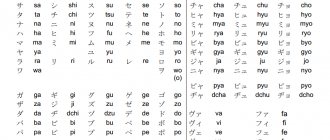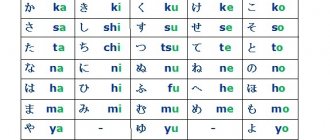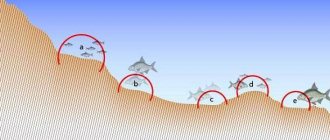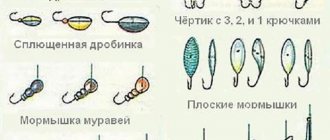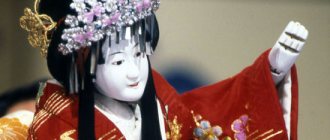Japanese language: how to understand it yourself?
What benefits does knowing Japanese give at least at a conversational level? You can read Murakami’s book in the original, watch anime without subtitles, communicate without a language barrier with residents of the Land of the Rising Sun, etc.
Almost all desires can be realized, including independent study of Japanese. Most importantly, be prepared to study hard.
The Japanese language is unique in its structure. Comparing it with the languages of European countries is at least pointless.
The alphabet and the rules for writing symbols are a rather difficult stage of learning. According to professional translators, it is better to start with frequently used phrases. This way the beginner will have an idea of grammar in general. Then you should gradually move on to learning the complex parts of the Japanese language.
How long does it take to learn Japanese?
What is your goal?
Do you want to watch anime in the original? Do you want to work with Japanese companies? Do you want to live in Japan or become a translator? We can say that after a few months of learning Japanese for 1-2 hours a day, you will already be able to watch anime with Japanese subtitles and have a good understanding of what is being said. We can't give you an exact figure because it depends directly on your desire to learn Japanese and the whole equation depends on this variable. You will hear different numbers everywhere because people teach differently and therefore get different results. If a person taught Japanese for 10 years and decided that Japanese can be learned in only 5 years, then, as a rule, he will not constantly look for new learning methods and try to reduce this period. Rather, on the contrary, a person will resist all innovations, defending his original statement. So take your learning into your own hands and don't listen to anyone (not even us). Always look for the most effective ways to study and work at your own pace . With the advent of the Internet, this has become easier than ever.
The best thing you can do is start now and come back to this issue in a couple of months, when you already understand the structure of the Japanese language, the amount of work ahead and how long it will take you to reach your goal.
Set the right goal and have fun
How long does it take to learn Japanese? The answer is long. We can even say so - for a long time . But whether it will be difficult depends only on your attitude towards learning. If you mutter to yourself that learning Japanese is hard work that not everyone can do, then your prophecy will come true and learning Japanese will become hard work for you. If you enjoy the process of learning Japanese, then what does it matter to you how long you study? In this case, on the contrary, the longer the better.
Let's say you start learning on Kanjiway today and in a month you will learn 500-1000 kanji. When watching an anime with subtitles, you will understand, for example, 15% of what is happening. At this time, your brain will try to sort out all the incomprehensible information and in a couple of days you will understand 16%, and after another couple of days - 17%. Step by step and day by day you will get closer to the mark that is your goal. But the secret to successful learning is that you must stop focusing so much on the end point of the journey.
Your correct goal should not be “Learn Japanese”, but “Increase your Japanese skill by 1%”.
Learning Japanese should be an enjoyable experience that you'll want to do when you get home from work. Learn Japanese not with textbooks, but with what you enjoy - be it anime, e-sports, painting or music. If you set yourself the goal of “learning Japanese” and constantly follow it, then every day you will ask yourself: “Did I learn Japanese today? Do I already understand Japanese football commentators?”, to which you will receive a negative answer for a long time and will finish studying much earlier than you achieve your goal. The paradox is that if you are very serious about learning the Japanese language, then first of all you need to stop taking it “seriously” and start taking it more measuredly, understanding the simple features of human psychology. When you start learning Japanese, it will become a part of your life and you need to manage to position it in your life so that it does not become a “thing to do”, a “responsibility to yourself” or a “tool that is not yet profitable” "
If you learn to follow the Japanese path step by step and set yourself the goal of “Increasing your Japanese skill by 1%,” then you will get the result not in a few months or years, but in a week or two. In addition, you will feel and understand that you are constantly moving forward and will accomplish not just one goal, but 70-100 goals along the way. Each of us has in our heads “Ordinary human brain, 1 piece.” If you constantly think about how to “learn Japanese”, then your brain will look at what is behind this thought and see 2500-3500 kanji, thousands of words and sentences and months of work. After which he will logically tell you “SO STOP STOP STOP, LET’S NOT GO THERE, LET’S BETTER WATCH YOUTUBE.” If you start constantly thinking about how to “increase your Japanese level by 1%,” then your brain will look at this thought and see 100-200 kanji there and say “Well, in principle, it’s not bad, you can try.”
Maybe even now you are thinking that “Japanese is very difficult, I’m unlikely to be able to learn it. And in general it takes a long time and is not particularly necessary.” In this case, stop thinking about how to learn Japanese and ask yourself “If Japanese is so difficult to learn, then maybe I’ll only learn 1% for now, and then we’ll see?” When you learn 1%, then stop and ask yourself, “Japanese is still very difficult, but maybe I can learn at least 2%, and then we’ll see?” If you want, instead of "1%" say "100 kanji" or "200 words". Surely you can learn 7 hieroglyphs a day and learn 100 hieroglyphs in 14 days?
You must understand that when you reach your ultimate goal and “learn Japanese”, then it will cease to be a special thing for you and will become an ordinary thing. Remember, for example, how much you enjoyed driving the first year after getting your license and how you feel about it now, or how happy you were when you bought your phone and what place it has in your life now. Or think about how often you remember that you know Russian and how cool that is and how you felt about it as a child when you first learned to read. Those parts of the Japanese language that now seem difficult or routine to you, such as learning kanji or not understanding new words - in a couple of years you will look back on them with fondness, realizing that the golden time was then (that is, now). Unfortunately, you can't just decide and start enjoying the process right away, but you can learn. So start learning now. Your brain and mood will thank you for it.
In the words of a classic: “We should be happy, we shouldn’t stress.”
Well, how long does it take to learn Japanese?
We hope that after reading this article, you begin to understand that “How long does it take to learn Japanese?” - this is the wrong question . If you ask yourself this question and look for an answer to it, then you will never learn Japanese . Your brain will decide for you that it is better not to waste time on such a long goal. Therefore, you must ask yourself the right question and ask yourself, “How long will it take me to achieve my goal?” What is your goal? Correct - 1%.
But you probably came for a specific number, so here is an approximate time frame for how long you will learn Japanese on Kanjiway :
- In the first month you learn hiragana, katakana and 100-300 kanji. You will be able to read hiragana and katakana, but you will not always understand what the word or sentence itself means. You will also be able to read simple sentences with learned kanji in Japanese and have a good understanding of what is being said.
- Over the next 2-3 months you continue to learn kanji and already know 1000-1500. You already understand enough to read average Japanese texts and watch Japanese anime/series with subtitles and understand about 40-60% of what is happening. You periodically look at the dictionary when you don’t understand something.
- Over the next 2-5 months, you increase the number of kanji to 2500. Now you understand Japanese text well and can watch anime/series with subtitles without any problems and not have to look at the dictionary every 10 minutes.
- You've learned all the kanji you need, but you still need to review them occasionally. You log into Kanjiway for another 1-3 months a couple of times a week and repeat the rarest kanji that you may sometimes forget.
We would like to clarify that by “learned kanji” we mean not just “read it once and remember it,” but “memorize it once and repeat it 4-10 times.” That is, maybe you still read kanji not as quickly as the Russian language, but you don’t need to look for their translation, you already remember it well.
In total, we ended up with about 6-12 months on Kanjiway. As you can see, the main training occurs in the first 2-4 months. We're giving average numbers here, but in reality you can go much faster if you want. Since Kanjiway is not a “Japanese course” in the classical sense, you don’t have a group of students with whom you need to stay on the same level and not run too far ahead. We do not put any restrictions on you and you can learn at the speed that is convenient for you.
Japanese alphabet
Forget about the usual, one-of-a-kind alphabet. Three are used in Japan. Each alphabet uses an individual writing system.
The future student should not forget about the presence of sounds.
Why do Japan use three alphabets? For comfort. To avoid confusion, the Japanese use a separate type of alphabet in a specific area:
- Hiragana is the alphabet for writing. A common letter in the Japanese alphabet can mean a combination of vowels and consonants. The letter turns into a syllable.
- Katakana is used exclusively for writing. Katakana is used to write words borrowed from European and other languages. Used to record “foreign” sounds.
- Kanji is an alphabet consisting of hieroglyphs. Most of the characters are taken from Chinese script.
Katakana, Hiragana are alphabets used in writing. Each character represents a sound, as opposed to kanji. In the latter, the spelling of a symbol can have different meanings.
Of the huge number of hieroglyphs, only two thousand characters were taken for widespread use. Kanji contains elements from katakana and hiragana.
Instructions for self-studying Japanese
She will explain in detail how to learn Japanese from scratch at home. All that remains is to supplement it with materials that interest you, select the correct teaching aids and provide regular classes. Remember that learning this language will not happen quickly - on average, even the most talented students take at least 3,000 hours to study to the JLPT N1 level. If you plan to study at home without tutors, feel free to add another 1,500 – 2,000 hours to this time. Do difficulties not scare you? Then proceed to the instructions.
Learn Japanese writing
In Japanese writing, the following are used simultaneously:
- Kanji are characters borrowed from the Chinese and are used to write the stems of words. These are 2,136 standard hieroglyphs and about 500 more “informal” ones.
- Hiragana is a 46-character syllabary used to write particles, unchangeable parts of a word, and some entire words.
- Katakana is a 46-character syllabary used to write borrowed words.
They need to be studied. On average, learning hiragana and katakana takes no more than 12 hours, which means a full week of self-education will be quite enough. With kanji it is much more difficult - hieroglyphs must be learned gradually. Practice shows that to understand half of all kanji in a text, you need to learn 80 kyoiku kanji and 170 of the most popular kanji. If you want to understand more than 90% of what is written, then you need to learn about 1,500 of the most popular kanji - this will take at least 2-3 years.
Start writing in Japanese
At the same time, try not so much to write with a pen on paper as to type. To do this, enable the Japanese layout on your computer and install a special keyboard on your phone (for example, Google-developed “Gboard” or its equivalent). Please note: some extensions allow you to write Japanese words in English letters and quickly convert them into hiragana and kanji later - this option will be especially useful for beginners. Don't forget to also install Japanese fonts in your browser and mobile phone.
Start learning Japanese grammar
In the first stages, the basics will be more than enough. Take any grammar textbook (we will recommend the most popular ones in the list of useful resources) and study it. In the initial stages, it is better to use manuals intended for beginners. The knowledge gained will help you understand the logic of the language and begin to correctly structure words in sentences.
Select dictionaries
They will be vital to you throughout your training. Choose the dictionary you like yourself or use the most popular ones. Please note: if you know English, then it makes sense to use not only Russian-Japanese, but also Japanese-English dictionaries - this will allow you to improve in two languages at the same time. We also recommend installing the Rikaichan browser extension, with which you can quickly translate any word in italics.
Start reading books and watching movies in Japanese
It’s not so important what exactly you watch or read - it could be anime, manga, books, films, popular TV shows or news items. It is better to select Russian or English subtitles for any video - this will help you simultaneously remember the meaning, pronunciation of words and their usual location in a sentence. Beginners are recommended to watch at least 150-200 hours of video in their first year of study.
Expand your vocabulary
Engage in replenishing your vocabulary. Use thematic collections of words, textbooks and mobile applications for this. Write down unfamiliar words when reading the texts of books, articles and songs, try to remember their meaning. First, study the words that Japanese people use most often in speech, and then move on to words and expressions from topics that match your interests.
Communicate with native speakers
This will help you correct your pronunciation and understand the peculiarities of the placement of accents in sentences. Conversations with Japanese will also introduce you to slang words often used in informal communication. You can find native speakers on social networks, popular apps and educational forums.
Studying grammar
Fact: Without knowing grammatical rules, learning Japanese is impossible. Without understanding the language structure, it will be difficult to understand how words and sentences are constructed in Japanese.
It may seem to a beginner that Japanese is a language where it is almost impossible to construct a whole sentence. Forget it. Despite the variety of sounds and syllables, constructing a speech in Japanese is not difficult.
- The subject is a part of speech that is not required for a sentence in Japanese. For the Japanese, the main meaning of a sentence is the predicate expressed by the verb. The action word must come at the end of the sentence.
- Gender does not apply to either nouns or verbs.
- Particles are another important component. Remember that the particle must match the word in front of it.
- Pronouns are used in dialogues or correspondence that require a formal tone. This part of speech is needed to indicate politeness.
Techniques for memorizing hieroglyphs
The most popular method is to write 1 hieroglyph in the copybooks. The auditory memorization method allows you to increase your ability to reproduce Japanese speech.
Cards
You can make cards with new words. They should definitely be accompanied by a transcription and an explanatory drawing.
Learning Japanese characters with flashcards.
Associations
Each hieroglyph is treated as a small story.
Replacing words
You need to find a word in your native language that is consonant with a word in a foreign language, then the first will become the key to remembering the second. For example, how to remember the word Mori - forest in Japanese: “forest” is a “sea” of trees.
Tutor or language school
When asked where to start learning Japanese from the very beginning, experts recommend using recorded Japanese audio lessons. There are quite a lot of them on the Internet, and everyone can choose the right option for themselves. This format will allow you to master the basics of Japanese, and then move on to a more complex level.
If you have more serious tasks ahead of you, for example, you are going to live or work in Japan, then you will not be able to avoid language courses.
You can enroll in a language school or take classes online. This format will not only allow you to learn useful phases, but will also teach you how to read and write in Japanese. With the help of qualified teachers, the language learning process will become correct, organic and effective.
The beginning of any lesson will be the study of the alphabet (katakana and hiragana). In two weeks you can master this material, knowledge of which will later allow you to write down phrases and sentences. This is an important stage, without which further work on learning the language is impossible.
Learning Kanji characters is much more difficult, but if you want to know the language perfectly, then it is worth your time. To learn Kandi, you should use flashcards designed for this purpose.
Immersion
Input > Output
If you understand well what we are describing in this paragraph, then learning any language will no longer be an insurmountable obstacle for you. This is a very simple idea and it lies in the following: consuming information in a foreign language is much more important than using this language. That is, listening and reading are much more important than speaking and writing. This is especially important to understand in the initial stages of training. Let's figure out why this is so.
Imagine how children learn their native language, for example, Russian. Do they read textbooks on the Russian language and study its grammatical structure? Do they take classes and fill in the gaps in sentences with words? Do they take turns repeating new words and sentences in front of the mirror? In no case. They live in an atmosphere of the Russian language, everyone around them speaks Russian, they read simple books in Russian and after a few years they already master it many times better than a foreigner who has been taking Russian language courses for the same amount of time. How does this happen? It’s very simple - our brain is already tuned to learning languages . If you watch a movie in a foreign language, you may not understand anything at the moment, but your brain spends its energy trying to decipher the new language. If you watch 10 more films (or better yet, watch the same film 10 times), then you will understand the language better. Much better than if you spent the same time cramming the grammatical structure of the language. Therefore, your main task when learning Japanese is this: surround yourself with Japanese as much as possible and cram into yourself as much information in Japanese as possible. Not textbooks and courses, where everything has already been chewed for you, but precisely the information that the Japanese themselves use.
Listen and read, even if you don't understand
Start devouring the Japanese language. Start watching anime with Japanese subtitles, start listening to Japanese podcasts, start reading manga in Japanese, find Japanese music that interests you and listen to it. This is how you will begin to truly learn the language. We are stopped by the discomfort that appears if we do not understand something. You need to get used to this discomfort while learning a new language, otherwise you will not achieve success and any meaningful progress. Listen to exactly what you like in life and is not related to Japanese. If you like football, watch videos about football in Japanese. If you are a programmer, listen to a podcast about programming. Yes, at first you will not understand anything, but over time you will begin to understand. Thus, in a few months, instead of searching for information on the RuNet, you will be able to Google in Japanese and find something interesting for yourself. With each new listen, you get closer to a good command of the Japanese language. If you watched some anime in Russian, then watch it again, but only in Japanese. You already know what the plot is and roughly remember what the characters are talking about?
In addition to actively immersing yourself in Japanese, you can also play something in the background. For example, if you are sitting in a quiet room, you can turn on something in Japanese and continue doing your thing.
In the first couple of months of this pastime, you do not need to scrupulously look up the translation of each new word with a dictionary. Just soak up the Japanese and you'll figure out everything else later. If you constantly listen to native speakers, then you simply technically will not be able to speak it incorrectly, because you are listening to the native Japanese in your environment.
By the way, an important note specifically for the Japanese language. In Japan, men and women speak differently. Something like Russian masculine and feminine genders for words, only more complicated. So it’s better to listen to the speech of a person of your gender, otherwise you risk ending up in the position of a man who describes himself in feminine terms or vice versa.
Create a Japanese atmosphere
Our environment influences us as much as our inner thoughts. If you get home after work and are faced with the choice of spending 30 minutes on Kanjiway or watching YouTube for 30 minutes, what would we base our decision on? Not just on your desires and “willpower”, but also on what surrounds you at the moment. What will we choose if in your room somewhere in the corner there is one Japanese tutorial that you have already stopped noticing, and the YouTube tab is so conveniently a couple of clicks away? Or conversely, what would you choose if there are many factors in your room that remind you of your goal to learn Japanese?
Here are some examples of how you can make your atmosphere as Japanese as possible:
- Buy some paper books in Japanese
- Hang Japanese posters on the walls. Including a poster with 2136 joyo kanji
- Switch your phone and computer to Japanese
- Write down all the learned kanji on a piece of paper (30-50 pieces per sheet) and hang them on the walls
- Write down grocery lists and any small notes using Japanese
- Manga wall
- (for the especially hardcore) Establish a VPN connection with Japan so that all sites and contextual advertisements are displayed in Japanese
Is it necessary to do all this? Well, of course not. It's much more important to actively absorb information through books, movies and podcasts, but this approach will greatly help you stay on track and not deviate too much from it. Surely you already have those books in Japanese that you would like to read, but don’t understand them at all yet. Put them in a prominent place and they will remind you of why you are learning Japanese.
Let's go back to the YouTube example. Now, if you walk into a room after work that has Japanese posters, Japanese books, and a computer running in Japanese, how much more likely are you to avoid wasting 30 minutes on fleeting pleasures?
If you well understood what we described in this article, then you probably noticed a live hack: you can watch Japanese YouTube
Do at least a little, but every day
Set yourself a minimum bar and make sure you meet it every day. We emphasize that this should be the minimum bar, do not overestimate it. Let it be five kanji. Or three. Or even one. At Kanjiway we have a streak system that makes sure you meet our minimum benchmark every day. This is about 10 reps, that is, repetitions of the information covered. Of course, on average you should learn more than the minimum level. The point of the minimum bar is that you achieve it every day . If at some point in your life you have a lot of things to do and you cannot devote 30-120 minutes a day to the Japanese language, but you do a streak, then in a few months you will understand how great you are for continuing to learn at least a little bit. The same as if you saved N rubles a day for the last few years. Everyone has bad days in life and the most important thing in them is to slow down a little, but under no circumstances stop.
Are textbooks needed?
The short answer is yes. The real answer is no. The long answer is - not really.
Textbooks will help you learn Japanese, but don't start with them (as we said, start with kana and kanji). The approach to learning a language with the help of textbooks is more correctly described not as learning a language for its use, but as learning a language for its linguistic study. It's more like learning to drive a car, which starts with learning about the internal combustion engine and thermodynamics. Did you need a textbook when you were learning Russian? You don’t need a textbook for Japanese either, but it will help if you use it correctly.
Our advice is to learn 1000 kanji, 500 words and 200 sentences, and then connect any textbook to your taste in order to better understand what exactly you have learned and what you should learn next.
The secret of the approach that we describe in this article is that you will learn most of the grammar automatically , simply through constant contact with the language. Moreover, in reality, not all phrases that we use in everyday life obey grammatical rules or simply common sense. For example, complete the sequence: one year, two years, three years, four years, five...? Five years? Five years? Another example: Spaniards live in Spain, Italians live in Italy, Japanese live in Japan, and Turkey live...? Turkish?
When you start learning a language by studying the laws of the language, you often figure out how you can cram the learned vocabulary into the studied grammatical structures, after which you proudly come to Japan and declare that “I am Turkish from Turkey, I have been studying Japanese for the last five years.” Therefore, use textbooks as an aid to learning Japanese, not as a basis. Your foundation is your hours of watching anime with Japanese subtitles and reading Japanese books.
When to learn to speak?
You don't have to learn the pronunciation of all the words from the very beginning. Don't concentrate on this, devote your energy to learning kanji. If you listen to Japanese a lot, over time you will automatically remember how to pronounce a sentence correctly, just like with grammar. Come back to this question 2-4 months after you start learning and decide for yourself how important pronunciation is to you right now, but in the initial stages of learning, understanding the language is much more important than using it.
Likewise, you don't need to learn the pronunciation of kanji from the very beginning (and they often have more than one pronunciation) - leave it for later and over time you will see that there is no need to devote as much time to them as you usually devote to them.
How long does it take to learn a language?
Everyone has their own pace of language learning. Offline courses require three years of study (half a year for each course). It is neither a fast nor a slow pace of learning. During this time, you can learn all the skills: speaking, listening, reading, writing. Studying for a period of three years does not mean that the knowledge is 100% obtained. It would be more correct to say that during this time the student will acquire basic skills and in the future will be able to independently continue to improve their language. Learning a language in a year or two is unlikely outside of Japan.
Where to start learning a language
The best thing to do is to immediately learn the Japanese alphabet, or rather the syllabary alphabet of Hiragana and Katakana. It is recommended to learn Japanese not with words, but with phrases. Japanese has a lot of standard phrases that are used in a polite style of speech. That is, if you learn the form of introduction, greeting, first acquaintance with colleagues, then with 100% probability this is exactly what the Japanese themselves say. At first I didn’t believe that the language should be taught in phrases, so imagine if you learned the Russian language only in phrases, what would happen? Because our language is multifaceted and unpredictable. Spoken Japanese is also a very lively and interesting language, but polite style is strictly regulated.
But still, in order to learn phrases, it is better to know a small vocabulary of the most common words. It is also easier to learn a language with phrases because in Japanese the sequence of words in a sentence (noun, verb, defined word, etc.) is fundamentally different from the Russian language. Once you learn individual words, it will be very difficult to form them into a sentence.
To learn a language you need to purchase:
- a block of opaque paper 9 x 9, these will be educational cards. On the one hand, it will be necessary to write down alphabet characters, words in Hiragana (Katakana), phrases, and on the other hand, the Russian translation. With such cards you can learn a language anywhere, in your spare time. And testing your knowledge using cards is easier and more convenient than in a textbook.
- a simple pencil marked B - soft or HB - hard-soft (you cannot use a pen, neither can you use an automatic pencil) and an eraser
- notebook in a square
- a textbook that you will use to learn the language, I wrote about it here
